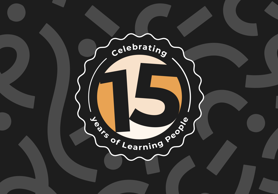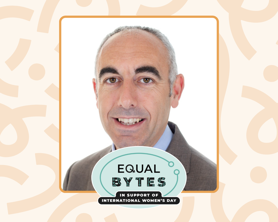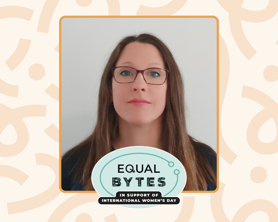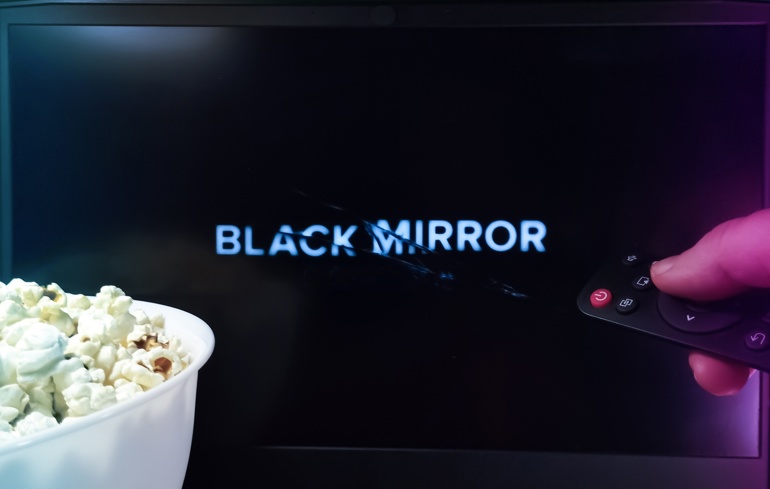Black Mirror has become a main source of eerily prophetic depictions of tech and its potential consequences on society. Since it started in 2011, Charlie Brooker’s dystopian anthology series has explored themes like surveillance, social media, artificial intelligence and bioengineering, many of which are extremely relevant to the way we’re experiencing real life. While some episodes seem like a glimpse into our immediate future, others remain speculative. Let’s talk about it!
Black Mirror’s most accurate tech predictions
1. Social credit systems: Nosedive
In Nosedive, society hinges on a rating system where people rank each other after social interactions, determining their access to jobs and housing, etc. This mirrors China’s Social Credit System, which scores people based on behaviours like paying debts on time or jaywalking. While the West doesn’t have an official equivalent, similar dynamics exist in Uber ratings and LinkedIn endorsements, affecting people’s real-world opportunities.
2. Mass surveillance: The Entire History of You
This episode envisions a world where people can replay every moment of their lives using memory implants. While we don’t have such technology yet, modern-day facial recognition, wearable cameras, and AI-powered surveillance have made constant monitoring a reality. Smart glasses, like Meta’s Ray-Bans or Apple's Vision Pro, already allow users to capture and recall real-life moments, blurring the line between privacy and oversight.
3. Deepfake and AI-generated content: The Waldo Moment
In The Waldo Moment, an animated character controlled by a comedian enters politics and gains mass influence, satirising populist political movements. Today, AI-generated influencers, deepfake politicians and synthetic media are not uncommon and an increasing concern. Advances in AI have made it easy to generate realistic faces and speech, raising concerns about misinformation and media manipulation.
4. Brain-computer interfaces: Black Museum
This episode showcases a technology that allows people to project their consciousness into digital spaces or other people’s minds. While full consciousness transfer remains sci-fi, brain-computer interfaces (BCIs) are rapidly advancing. Elon Musk’s Neuralink and other companies are developing implantable devices that allow humans to control computers with their thoughts, opening doors to the potential of mind-controlled prosthetics, memory storage and even communication without speech.
What’s still sci-fi (For Now)
1. Full-immersion virtual reality: San Junipero
The idea of uploading your consciousness to a digital paradise is probably one of Black Mirror’s most optimistic takes on tech. While virtual reality (VR) and augmented reality (AR) are evolving, we’re far from being able to transfer human consciousness into a permanent digital afterlife.
2. Human ratings directly affecting reality: Nosedive
While China’s Social Credit System has elements of Nosedive, a global society where social ratings directly control every aspect of life is thankfully still sci-fi. The logistical and ethical obstacles of implementing something like this at scale in democratic countries would be difficult to get past. However, social media’s increasing influence on relationships and reputations is indicative of a future where public perception carries even more weight.
3. Memory implants: The Entire History of You
Although surveillance technology has made data collection widespread, the ability to record and replay every moment of one’s life via an implanted device is still out of reach. Scientists are exploring brain implants for memory restoration in Alzheimer’s patients, but a consumer-friendly memory-recording implant remains far-fetched.
4. Sentient AI
Many Black Mirror episodes, such as White Christmas, portray AI with fully realised human emotions and consciousness. While AI can simulate conversation convincingly, it lacks genuine self-awareness and independent thought. Experts debate whether AI could ever achieve true consciousness, but for now, it remains an advanced mimic rather than a sentient entity.
A future written by Black Mirror?
Black Mirror has been pretty accurate in predicting tech advancements and their social consequences. Many of the show’s dystopian scenarios—AI-driven personal assistants, deepfake technology, social credit systems, and brain-computer interfaces—are either already here or rapidly approaching reality. However, some of the more extreme concepts, such as consciousness uploads and sentient AI, remain purely speculative.
As technology continues to evolve, Black Mirror serves as both a warning and a mirror, reflecting the potential paths we may take. While some advancements can enhance our lives, others carry risks of ethical dilemmas and unintended consequences. The real question is: will we learn from the cautionary tales Black Mirror tells, or are we destined to live them?
Future-proof your career in tech
With tech moving at such a pace, staying ahead of the curve is essential. If you're considering a career change to IT or exploring cybersecurity jobs, now is the time to act. Whether you’re interested in entry-level IT careers, or training in fields like IT project management, we can help you take the next step.
Explore cybersecurity courses and IT training programmes designed to equip you with the skills needed for a future-proof career. Start your journey today!
Header image credit: Artskrin / Shutterstock.com
Related Articles
 Tech
Tech15 years of student success with Learning People
From our first course to empowering over 40,000 students worldwide, Learning People is thrilled to celebrate 15 years of facilitating career transformations.
Read More Tech
TechBlack Mirror’s most accurate tech predictions (and what’s still sci-fi)
Discover which Black Mirror tech predictions have become reality, from AI and surveillance to social credit systems, and what’s still science fiction. Learn how to future-proof your tech career today.
Read More Tech
TechInclusivity in Cyber Security | An interview with Rob Black
In this insightful conversation, Rob Black, a prominent figure in the UK cybersecurity industry, discusses the importance of creating an inclusive and supportive environment for everyone, regardless of background or gender.
Read More Tech
TechLife in Cyber Security | An interview with Karine Tobin
If you're curious about breaking into cybersecurity or simply need a boost of motivation to pursue your goals, this conversation is packed with insights on resilience, the power of networking, and why finding your “why” makes all the difference.
Read More
